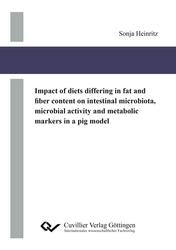| Areas | |
|---|---|
| Serie de libros (97) |
1381
|
| Nachhaltigkeit |
3
|
| Gesundheitswesen |
1
|
| Letra |
2369
|
| Ciencias Naturales |
5408
|
| Matemática | 229 |
| Informática | 319 |
| Física | 980 |
| Química | 1364 |
| Geociencias | 131 |
| Medicina humana | 243 |
| Estomatología | 10 |
| Veterinaria | 108 |
| Farmacia | 147 |
| Biología | 835 |
| Bioquímica, biología molecular, tecnología genética | 121 |
| Biofísica | 25 |
| Nutrición | 45 |
| Agricultura | 1005 |
| Silvicultura | 201 |
| Horticultura | 20 |
| Ecología y conservación de la tierra | 148 |
| Ciencias Ingeniería |
1795
|
| General |
98
|
|
Leitlinien Unfallchirurgie
5. Auflage bestellen |
|
Erweiterte Suche
Impact of diets differing in fat and fiber content on intestinal microbiota, microbial activity and metabolic markers in a pig model (Tienda española)
Sonja Heinritz (Autor)Previo
Lectura de prueba, Datei (690 KB)
Indice, Datei (590 KB)
The human intestinal microbial ecosystem plays an important role in maintaining health. Thereby, dietary modulation appears to be an efficient tool to beneficially steer microbial composition and metabolism. Within this regard, there is a considerable need for animal models to study potential ways of influencing health by dietary means. Thus, the objective of this thesis was to evaluate the use of the pig as potential model for research into dietary modulation of the human gut microbiota. First, a comprehensive literature review was given, comparing the human with the porcine gut microbiota and discussing existing studies concerning microbiota related diseases using the pig as a model. Furthermore, in a study with pigs, the effect of two different types of diets varying substantially in fat and fiber content on gut microbiota and microbial metabolites in feces and digesta samples was determined. High fiber content stimulated bacteria considered beneficial due to potential probiotic properties, particularly in view of human health. On the other hand, a high fat content fostered potential pathogenic bacteria. These data support diet as an important factor that shapes gut microbial community in a similar way to humans, which can help to establish the pig as a model for the evaluation of diverse forms of nutrition and dietary components.
| ISBN-13 (Impresion) | 9783736993402 |
| ISBN-13 (E-Book) | 9783736983403 |
| Formato | A5 |
| Idioma | Inglés |
| Numero de paginas | 162 |
| Laminacion de la cubierta | Brillante |
| Edicion | 1. |
| Lugar de publicacion | Göttingen |
| Lugar de la disertacion | Hohenheim |
| Fecha de publicacion | 30.08.2016 |
| Clasificacion simple | Tesis doctoral |
| Area |
Agricultura
|
| Palabras claves | Pig, diet, microbiota |








